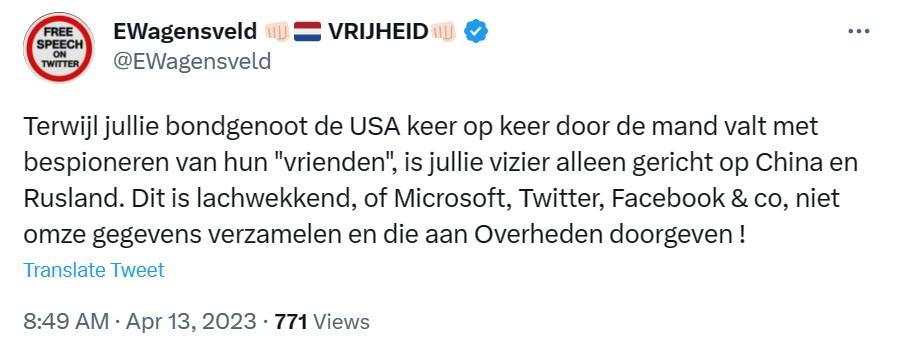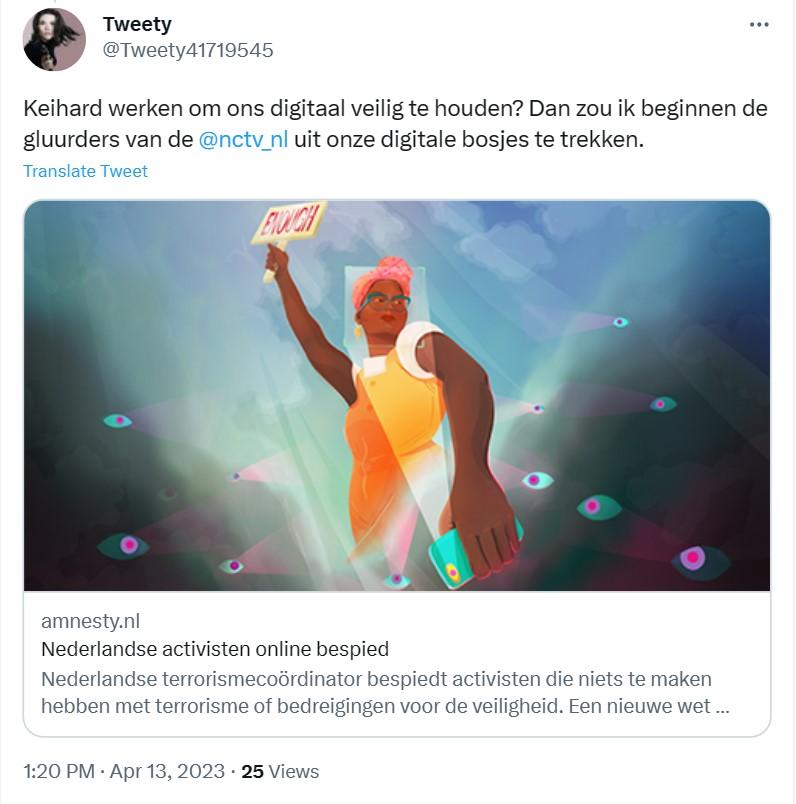
Digital privacy or geopolitics: perspectives on the VVD leaving TikTok
Following many other governments and states, Dutch political party VVD (de Volkspartij voor Vrijheid en Democratie) recently announced their retreat from the Chinese social media platform TikTok. This article analyses Twitter users’ responses to the VVD’s retirement from the app and explores which perspectives, regarding TikTok and digital privacy, arise among everyday Twitter (now X) users.
Retreating from TikTok
On April 13th, 2023, the VVD announced that they were going to delete their TikTok account. After having used the platform for several years, the party decided to quit the social media platform completely for safety reasons.
According to the VVD (2023), TikTok is managed by “Chinese developers” and their security services expect a “higher risk of espionage with such apps.” Queeny Rajkowski, who is a member of the parliament for the VVD, even said that the party is “not ruling out a nationwide ban” (Peer, 2023).
As becomes clear from the VVD’s message about their sudden retirement from TikTok, the main reason for deleting their account is the heightened risk of espionage. The political party is afraid that, through TikTok’s notorious data collection practices, the app can spy on the political party – and therefore possibly on the state. Westin (1967, p. 7) defines privacy as:
“The claim of individuals, groups, or institutions to determine for themselves when, how, and to what extent information about them is communicated to others.”
He also identifies four functions of privacy, one of which is ‘personal autonomy,’ referring to “the desire to avoid being manipulated, dominated or exposed by others” (Margulis, 2011, p. 10). Considering Westin’s definition of privacy, one could say that VVD’s retirement from TikTok is entirely a privacy-related issue. Overall, the party is worried about possible espionage, which would allow third parties to collect – and possibly also expose – information about the political party. In this case, that third party would be TikTok.
A possible privacy infringement would be an adequate reason to quit the social media platform, though it seems that there are more factors at play in this issue.
The worldwide trend of abandoning TikTok
The VVD is not the first political party or government agency to quit – or completely ban – TikTok. The discussion surrounding TikTok and data privacy has been prominent ever since former U.S. president Donald Trump announced that the U.S. government was considering banning the social media platform completely in 2020. Although this executive order has been revoked by current U.S. president Joe Biden, many other countries and governments have decided to forbid the app on government devices (i.e. phones), or ban the app in its entirety (Chan, 2023).
What is interesting about the discourse on TikTok’s data privacy is that China is always mentioned in one way or another. Trump’s executive order speaks of:
“(…) mobile applications developed and owned by companies in the People’s Republic of China (China) that continue to threaten the national security, foreign policy, and economy of the United States.” (Trump, 2020).
Discourse on TikTok and digital privacy often has an explicit focus on 'China'.
Furthermore, the VVD explicitly mentions that TikTok is managed by “Chinese developers” in the video where they announce their retreat from the social media platform. This explicit focus on TikTok being an application from Chinar is interesting. It begs the question: do governments and political parties quit or ban TikTok for privacy considerations, or are there geopolitical forces at play?
A geopolitical battle
As Mishra, Yan & Schroeder (2011, p. 815) state:
“Geopolitical rivalry and geoeconomic competition (…) are shaping the Internet and are emerging as a source of conflict in the 21st century.”
Their research has shown how India’s nationwide ban on TikTok is an example of strong geopolitical signing. Moreover, as becomes evident from a geopolitical analysis conducted by Gray (2021), TikTok has found itself in a geopolitical contest in the international digital platforms market with the US.
Lastly, research has shown how recent news coverage surrounding TikTok and privacy focuses on the app’s Chinese background and its relationship with the Chinese government (Miao, Huang & Huang, 2023). This research also revealshow nationalist frames and the protection of national security are dominant themes in the discussionon TikTok (Miao et al., 2023). Overall, these findings suggest that some major geopolitical forces are influencing the (political) debate about TikTok and data privacy.
So far, two ways to consider the broader issue surrounding TikTok, data privacy, and governments have been identified. On the one hand, this issue can be solely an issue of privacy and espionage. On the other hand, it seems to have some geopolitical weight to it.
This article analyses the discourse that emerged on Twitter (now called 'X') after the VVD announced their retreat from TikTok and highlights the perspectives and opinions that were prominent in this discourse. Therefore, this article intends to answer the questions: “How do users react to the VVD quitting TikTok?” and, consequently, “Which perspectives regarding TikTok and data privacy are prevalent among Twitter users?”
For the purposes of this article, the platform X will still be referred to as 'Twitter'.
Method
This article examines Twitter users’ comments on tweets that were posted on the VVD’s Twitter account concerning their retreat from TikTok. The VVD posted four tweets regarding this matter, all posted on the 13th of April 2023. Additionally , the political party retweeted a post from party member Queeny Rajkowski which also talked about their retreat from TikTok. In total, these five tweets received 661 comments, which I will analyse in the following section.
For my analysis, I used multimodal discourse analysis with a focus on indexicality (Blommaert, 2005). Multimodal discourse analysis is a method of discursive analysis that takes multiple modes of communication into account and examines how these modes interact to create semiotic meaning (Diggit Magazine, n.d.). This method is especially useful for discourse analysis on social media since social media posts – Tweets in this case – often incorporate multiple modes of communication, such as text, images, emojis, hashtags and sometimes even GIFs.
Users’ perspectives
Jokes, memes and hate comments
Looking at the comments on the VVD’s tweet, four main types of responses can be identified:
1) scolding the VVD, 2) jokes and memes, 3) affirmative responses, and 4) critical responses.
By far the most prominent theme was ‘scolding the VVD.’ This category encompasses all tweets that critiqued the VVD as a political party and did not necessarily refer to the topic of discussion; TikTok and data privacy. Rather, these tweets critiqued the VVD’s actions or told the political party to stop not just with their TikTok account, but with their political party in general (figure 1).

Figure 1: "Please also leave Twitter, Facebook, Whatsapp and the House of Representatives!" (translated)
Figure 1: Screenshot of Twitter user 'scolding the VVD'
Comments such as the above are to be expected on Twitter – much like the jokes and memes that emerged in the comments. Users leaving hate comments or using humour to respond to posts is an ordinary practice on this social media platform. Therefore, the first two categories are, despite their size, relatively negligible for further analysis.
What is more interesting, then, is the big corpus of comments that fall in the ‘critical responses’ category. For the sake of clarity, I have divided this category into three subcategories, which are:
1) Mentioning or referencing the USA, 2) Calling out hypocrisy, and 3) Highlighting other privacy issues.
Mentioning or referencing the USA
A substantial amount of comments mention or refer to the United States. Most of these comments are critical of the VVD banning TikTok since they state that not only China but also the USA tends to spy through their digital platforms, such as Facebook and Google. For example, one tweet says:
“While your ally the USA continuously falls through the basket by spying on their “friends,” your vision is only directed at China and Russia. This is hilarious, as if Microsoft, Twitter, Facebook & co, don’t collect our data and pass it down to governments !” (translated) (figure 2).

Figure 2
Figure 2: Screenshot of Twitter user 'mentioning or referencing the USA'
Other tweets in this category label the VVD’s decision to quit TikTok as partisan, meaning that the VVD blindly follows the United States. For example, one user tweeted:
“🚨”Yes America, all right America, we will America, shall we send some more weapons America? Can I take another picture with Biden America (psst, it’s for my mom)” (translated) (figure 3)

Figure 3
Figure 3: Screenshot of Twitter user's critiquing the VVD as partisan to the USA
It is interesting to note that in this tweet, the user included a red alarm emoji. This could indicate that the user thinks that the VVD supporting America and blindly following them is an alarming matter.
Calling out hypocrisy
A lot of users also called the VVD’s behaviour hypocritical. Most of these tweets referred to other apps that have similar privacy issues or to privacy-infringing behaviour from the Dutch government itself. What makes the VVD hypocritical, then, is that they are banning TikTok, but not all the other platforms that raise similar privacy concerns. What makes this category different from the above mentioned one is that the users not only refer to American apps or digital tools that infringe on digital privacy but also to technologies from other countries (figure 4).

Figure 4: "But we do like American and Israelian espionage" (translated)
Figure 4: Screenshot of Twitter user calling the VVD's usage of other digital platforms hypocritical
Another user points out an article which shows that Dutch government organisations are currently digitally spying on Dutch activists themselves, and therefore declares the VVD hypocritical for wanting to keep the Netherlands “digitally safe”:
“Working hard to keep us digitally safe? I would start by pulling the lurkers from the @nctv_nl out of our digital bushes.” (translated) (figure 5).

Figure 5
Figure 5: Screenshot of Twitter user critiquing the VVD hypocritical in terms of their own espionage
Highlighting other privacy issues
The third subcategory has some overlap with the other two categories. Once again, users in this category are disapproving of the VVD’s decision, since they believe that there are other platforms or digital tools that are just as – if not even more – dangerous. One user tweeted:
“Eeh TikTok eeh Chinese espionage dangerous. Come on, let’s all go to Twitter the property of a little independent rich owner a looooot more serious and safe” (translated) (figure 6).

Figure 6
Figure 6: Screenshot of Twitter user criticizing the VVD's decision to stay active on other platforms and utilize other digital tools
What is interesting about these three subcategories combined is that China is often mentioned in these tweets, thereby illustrating users’ awareness of possible geopolitical connections. Furthermore, all tweets in this category compare TikTok to other countries, apps, or technologies and share the rationale that banning TikTok is a superfluous move since privacy concerns are everywhere, not just on a “Chinese platform.”
Twitter users that are critical of VVD's decision often refer to other privacy perils or TikTok's Chinese background.
Through these critical responses, users seem to demonstrate their awareness of a sort of digital orientalism. Here, orientalism refers to the way in which Western society depicts aspects of the Eastern World with racist or romanticised stereotypes and mythologies, so that Western colonialism and imperialism is justified (Saïd, 1978). In other words, it is the West controlling and authorising views of “the East”, which, in this case, is done by governments through framing the Chinese platform TikTok as a privacy risk. This framing is remarkable given that – as users on Twitter make clear – the track record of US tech companies is in itself contestable.
Affirmative responses
Finally, a small number of users were supportive of the cause. However, these tweets were scarce and often received a lot of backlash. For example, parliament member Hind Dekker-Abdulaziz shared her appreciation for the cause with a Tweet but got eight replies that all fall within one of the three critical categories mentioned above.
Privacy, why does it matter anyway?
Many Twitter users compared TikTok to other social media sites, digital tools, governmental agencies, or technologies that they believed posed similar privacy threats as the Chinese social media platform does. This demonstrates that users are generally aware of the current omnipresent concerns for digital privacy.
However, it is interesting that, despite this awareness, tweets appreciating VVD’s decision to quit TikTok – and thereby securing their digital privacy – were scarce. Users seem to be generally aware of digital privacy threats but are critical of the VVD’s decision to retreat from the social media platform. These users criticize the VVD for quitting solely TikTok rather than praising it for taking the first step toward better digital privacy. Consequently, the Twitter comments throw into relief other interesting points.
In almost all of the critical responses, ‘China’ was a popular topic. Users connect the VVD’s behaviour to geopolitical tensions and deem the behaviour hypocritical because there are other countries, digital technologies, governmental instances, and social media platforms that expose similar – or even worse – privacy threats. Therefore, just quitting TikTok is - in the eyes of the Twitter users - not enough. This demonstrates users’ awareness of digital orientalism and platform ownership, in a way that shows their recognition of geopolitical forces in the digital tech realm. It seems like Twitter users believe that, if the VVD truly desired to enhance digital privacy, they would have stopped with all social media platforms. Not just one created by Chinese developers.
''If you cared about digital privacy, you would have stopped with all social media platforms."
Overall, the users’ comments on Twitter demonstrate two things:
- Users are aware of the many privacy perils that surround social media and digital technologies.
- Users recognize and acknowledge the geopolitical forces that are at play in the discussions surrounding TikTok, governments, and data privacy.
What is remarkable about the critique on the VVD’s decision to quit TikTok is that a majority of the users deem the move so superfluous and hypocritical that it signals the belief that this is not a logical move for the VVD, but rather them participating in a larger trend of penalizing Chinese platforms – as is seen more often in American politics. Therefore, these Twitter comments demonstrate the prevailing awareness of geopolitical rivalry in the digital tech platforms' market, and it posits the general sentiment towards this phenomenon as hypocritical and digitally orientalist.
References
Blommaert, J. (2005). Discourse: A Critical Introduction. Cambridge University Press.
Chan, K. (2023, April 4). Here are the countries that have bans on TikTok. AP NEWS.
Executive Order on Addressing the Threat Posed by TikTok – The White House. (2020, August 6). The White House.
Gray, J. (2021). The geopolitics of ‘platforms’: the TikTok challenge. Internet Policy Review, 10(2).
Margulis, S. T. (2011). Three Theories of Privacy: An Overview. In Springer eBooks (pp. 9–17).
Miao, W., Huang, D., & Huang, Y. (2021). More than business: The de-politicisation and re-politicisation of TikTok in the media discourses of China, America and India (2017–2020). Media International Australia, 186(1), 97–114.
Mishra, M., Yan, P., & Schroeder, R. (2022). TikTok politics: Tit for tat on the India–China cyberspace frontier. International Journal of Communication, 16(26).
Peer, W. (2023, April 13). VVD stopt met TikTok en wil landelijk verbod ‘als dat moet’: ‘Wij schuwen geen enkele maatregel’. Het Algemeen Dagblad.
Saïd, E. W. (1978). Orientalism. The Georgia Review, 31(1), 162-206.
Westin, A. (1967). Privacy and Freedom. Atheneum.